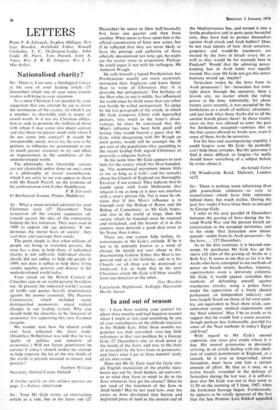LETTERS
From P. B..Edwards, Stephen Milligan, Rev Guy Bowden, Archibald Tober, Ronald Cholodny, T. C. Skeffington-Lodge, John Todd, M. Parry, Tom Pocock, John A. Yates, Rev A. R. D. Simpson, Rev J. S. MacArthur.
Nationalised charity?
Sir: There is, I am sure, a theological fallacy at the core of your leading article (27 December) which one of your more erudite readers will bring to your attention.
As a mere Christian I am puzzled by your suggestion that any attempt by me to direct the institutions of the society, of which I am a member, to charitable ends is empty of moral worth. Is it not my Christian obliga- tion to seek to promote the welfare of those with whom I may come into direct contact and also those (in greater need) with whom I do not come into contact? It would be irresponsible, surely, not to try, by vote or by petition, to influence my government to use its much greater resources to try and effect an improvement in the conditions of the underdeveloped world.
The philosophy that 'charitable' actions are not charitable unless done on one's own is a philosophy of moral masturbation, which I am sorry to see you appear to share with Mr Enoch Powell. on the evidence of his confrontation with Father 14uddleston.
P. B. Edwards 61 Birchmead Avenue, Pinner, Middlesex Sir: What a mean-minded editorial for your Christmas issue (27 December)! You resuscitate all the ancient arguments ad- vanced against the idea of the community helping the less fortunate. They were used in 1909 to oppose old age pensions. 'It un- dermines the moral basis of society', they said then, and you copy their words.
The point simply is, that when millions of people are living in wretched poverty, the state has a duty to help them, if individual charity is not sufficient. Individual charity clearly did not suffice to help old people in 1909, nor does it suffice to help those living amidst squalor, poverty and disease in the underdeveloped world today.
Your attack on the British Council of Churches sign-in on world poverty bewilders me. At present, the industrial world's system of tariffs and quotas heavily discriminates against the poorer countries. The Pearson Commission, which included many distinguished economists, urged radical changes in our trading system. Why you should hold the churches to be 'innocent of economics' for supporting this view, I cannot imagine.
We wonder now how the church could ever have tolerated the slave trade. (Doubtless Wilberforce was told that he was `guilty of politics and innocent of economics'.) Will not future generations be curious if today's church makes no attempt to help improve the lot of the two thirds of the world at present doomed to misery and poverty?
Stephen Milligan Secretary, Oxford Union, Oxford I
A further article on this subject appears on page 5.—Editor, SPECTATOR Sir: Your Mr Gale writes an entertaining article as a rule, but in his latest one (27 December) he seems to blow half-heartedly first from one quarter and then from another. What seems to have upset him is the official canonisation of forty new saints, but if he reflected that they are never likely to have the prestige and authority of those officially decanonised not long ago, he might see the matter more in proportion. Perhaps he could argue it out with his colleague, Mr Auberon Waugh.
He calls himself a lapsed Presbyterian, but Presbyterians usually are more accurately instructed than Anglicans and know better than to write of Christmas that `it is desirable but unimportant'. The birthday of the Man who, to put it mildly, has influenced the world since his birth more than any other can hardly be called unimportant. To judge by the last paragraph of the article, in which Mr Gale compares Christ with bejewelled prelates, very much to the latter's disad- vantage, he must be convinced that this Man's influence has been both good and lasting. One would hazard a guess that Mr Gale, while disagreeing with Mr Waugh on most points, would still be amongst the 38 per cent of the population who, according to the recent Gallup Poll, regard Christmas as primarily a religious festival.
At the same time Mr Gale appears to care little for the society which this Man founded, eg, 'The ecumenical movement means little to me so long as it fails'; and his remarks about the Church of England are thoroughly Erastian, if not cynical. They indicate that he would agree with Lord Melbourne that religion is OK as long as it does not interfere with a man's private life. Yet it must be ob- vious that if this Man's influence is to triumph over 'the Bishop of Rome and the Bishop of Canterbury', as Mr Gale hopes, and also in the world at large, then the society which he founded must be reunited and revitalised, and the branch of it in this country must demand a good deal more in his Name than it does.
There are, one cannot help feeling, in- consistencies in Mr Gale's attitude. If he is not to be unkindly known as a wind of change, he should not veer about in this disconcerting fashion. Either this Man is im- portant and so is his birthday and so is his Church—or all three can be dismissed as irrelevant. Let us hope that in his next Christmas article Mr Gale will blow steadily from one direction or the other.
Guy Bowden Lucaslands, Highbrook, Ardingly, Haywards Heath. Sussex














































 Previous page
Previous page